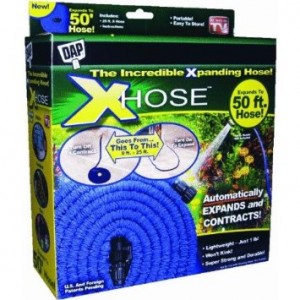 Top Class Action Lawsuits
Top Class Action Lawsuits
Did you get hosed by DAP? A defective products class action lawsuit has been filed against hose manufacturer Dap Products, Inc, alleging the the Xhose and the Xhose Pro are defective and do not perform as advertised. No comment.
According to the DAP Xhose complaint, the hose is made out of a thin plastic internal tube with a thin cloth layer on the outside. Dap advertises the hose as providing an alternative to standard garden hoses because it is lightweight and can contract without “kinking.” “Defendants’ marketing and packaging states that the XHose is tough, durable, and long-lasting,” the lawsuit states. “Contrary to defendants’ representations, however, the XHose is defective and predisposed to leaking, bursting, seeping and dripping due to no fault of the consumer.”
According to Cynthia Finnk, who filed the complaint, she purchased two XHose Pros in December 2013 both of which eventually exploded during use. Oh yes—that could send you over the edge. Apparently, the company sent her a total of eight replacement hoses after the products continued to explode when in use, according to the lawsuit. Ok, what’s your first clue that quality control is an abstract concept here. The company allegedly refused to give a refund because the 90-day refund period had expired. Bingo!
The lawsuit was filed on December 24th, by plaintiffs Michael Carton, Cynthia Finnk, Rocco Lano, Laurina Leato, Marilyn Listander and Roger Mammon filed the lawsuit also names National Express and RPM International as defendants. The plaintiffs are seeking class status for the suit, and in excess of $5 million in damages. The case is United States District Court for the Northern District of Maryland case number 1:14-cv-04015.
Naughty Nissan! They got hit with a federal defective automotive class action lawsuit this week, alleging Nissan North America failed to warn consumers about dangerously defective transmissions in 2013-2014 Pathfinder vehicles. The alleged defect poses a potentially serious problem at any time, particularly when a car is merging onto high-speed traffic on a freeway, according to the lawsuit. Really?
The Nissan lawsuit alleges that, on acceleration from 15 to 30 mph, the vehicles are subjected to unexpected shaking and violent jerking (“juddering” or “shuddering”), preventing the vehicles from accelerating. And no doubt putting fear into the hearts of drivers and passengers alike.
The lawsuit states: “This transmission defect creates an unreasonably dangerous situation and increases the risk of a crash; it is inevitable that an individual will be injured or killed due to a collision caused by this safety defect.” But hey—if it hasn’t happened yet—why worry about it, right?
The lawsuit alleges that Nissan concealed and knowingly sold and leased vehicles with the dangerously defective transmissions, and through its dealers failed to honor express and implied warranties to repair and replace the dangerously defective transmissions. Instead, the 77-page lawsuit claims, consumers’ complaints were delayed, deflected, and ultimately denied.
Heads up folks—this defect potentially affects tens of thousands of consumers throughout the country. The Consumer Class Action Complaint seeks damages in excess of $5 million, injunctive and declaratory relief, and punitive damages for claims of breach of express and implied warranties, violations of the Magnuson-Moss Warranty Act, and violations of the Florida Deceptive and Unfair Trade Practices Act.
The action, filed December 15, 2014, is Batista vs. Nissan North America, Inc., no. 1: 14-cv-24728-RNS, filed in the U.S. District Court for the Southern District of Florida.
Top Settlements
Honda got its knuckles wrapped this week, as they agreed to pony up $70 million in fines to resolve allegations made by US federal regulators that from 2003 to 2014, the auto maker failed to report 1729 deaths and injuries related to possible safety defects in its vehicles. According to the National Highway Traffic Safety Administration (NHTSA), Honda will pay two $35 million civil penalties, effectively resolving its alleged lapses in early-warning reporting.
The early-warning reporting requirements are part of the Transportation Recall Enhancement, Accountability and Documentation (TREAD) Act, which requires car manufacturers to submit reports to the NHTSA every quarter to alert the agency of deaths or injuries arising from possible safety defects. The NHTSA states that Honda failed to provide early-warning reports to the agency to alert it about safety-related issues. The fines also address Honda’s alleged failure to report some warranty claims and customer satisfaction-related claims during that time, according to the agency.
Honda faced a barrage of class actions related to defective Takata air bags late in 2014, after which the NHTSA issued a special order directing Honda to explain its failure to fully report deaths and injuries related to possible auto safety defects, as required under the TREAD act.
According to the early-warning reports filed with the NHTSA, the 1,729 unreported injuries and deaths that Honda allegedly failed to report constituted more than double the number of incidents the automaker reported to the NHTSA during the past 11 years.
According to Honda, the under-reporting of those death and injury notices was due to “errors related to data entry, computer coding, regulatory interpretation, and other errors in warranty and property damage claims reporting.” Yeah—blame it on the help. Good one guys.
So, under the terms of the settlement, Honda has also agreed to conduct third-party audits of its reporting, train its staff in fulfilling TREAD Act requirements and devise compliance procedures.
Hokee Dokee—That’s a wrap folks…Time to adjourn for the week. See you at the bar.
